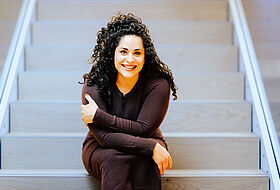Roles Performed
2023 Alt Solistin, Johannes-passion (staged production), Staatsoper Stuttgart, Germany
2022 Küchenjunge, Rusalka (A. Dvořák), Staatsoper Stuttgart, Germany
2022 Plotina, Hadrain (R. Wainwright), Teatro Real, Peralada Festival
2022 Bradamante, Alcina (G. F. Händel), Staatsoper Stuttgart, Germany
2022 Ozias, Juditha Triumphans (A. Vivaldi), Staatsoper Stuttgart, Germany
2020/22 Fjodor/Die Aktivistin, Boris Godunov (M. Mussorgsky), Staatsoper Stuttgart, Germany
2020/21 Dritte Dame, Die Zauberflöte (W. A. Mozart), Staatsoper Stuttgart, Germany
2020/21 Dinah, Trouble in Tahiti (L. Bernstein), Staatsoper Stuttgart, Germany
Education
2019-22 Opernstudio Staatsoper Stuttgart, Germany
2019 Opera Theatre of St. Louis Gerdine Young Artist Program, Missouri, USA
2018 Merola Opera Program at the San Francisco Opera Young Artist, USA
2016-18 Master of Music, Yale University, New York, USA
2012-16 Bachelor of Music and Vocal Performance, Northwestern University, USA
Competitions and Awards
2023 Belvedere Competition
2023 Semi-Finalist, Concurs Tenor Viñas
2022 Final Round Participant, NEUE STIMMEN Competition, Gütersloh, Germany
2021 Semifinalist, Montserrat Caballé International Singing Competition, Barcelona, Spain
2021 Semifinalist, Belvedere International Singing Competition, Austria
2021 Semifinalist, Concours Tenor Viñas, Barcelona, Spain
Stand: 2023
In which theatre or opera house would you like to perform?
My love for opera began at the Metropolitan Opera. As a member of the Children’s Chorus, I learned how to sing in productions of Carmen and Pique Dame and Boris Godunov. I owe so much of my foundation and my artistic development to lessons I learned as a child at the MET. So naturally, I would love to be back on the same stage that nourished me as a child.
However, having witnessed the shutdown of so many artistic venues and the crippling silence that followed in our field during the pandemic, I am filled with gratitude to perform in any opera house or venue.
What do you consider your most important mission as an artist?
I believe music to be the great unifier. The fact that I, as a 28-year-old Cuban-American woman, can sing an opera from three hundred years ago, and in doing so, can elicit a response from someone in the audience I share little in common with, is magic beyond my control.
Thus, my mission as an artist is to serve as the best vessel possible for music to reach others. Beyond race, creeds, generations, values, languages, and all the many things that could potentially divide us, my greatest hope would be to unite. This power—to be something greater than ourselves through the art form—will never cease to astound me. I know that in doing so effectively, for that moment in time, I could be reducing the isolation that so many people feel. It is a beautiful privilege to communicate with others in this very unique way.
Time Machine or Magic Wand?
As artists, we go through years of training to create historically accurate interpretations of masterpieces that would honor the composer’s wishes. We study the motivation for writing these works, the society that inspired the music-making.
I would choose a time machine, every time, because I would want to be in the action to understand first-hand why this art has transcended generations. I would talk with Verdi about why he chose to write Nabucco during the Risorgimento. I would ask Beaumarchais about character development throughout his trilogy of plays on Figaro. I would watch Bach conceptualize the Johannespassion.
In doing so, I could apply the inspiration from the past to my interpretation as a 21st-century artist. We have the supreme opportunity as artists to actually live this by engaging and collaborating with contemporary opera composers right now. But, in an artform steeped in the rich history of its past, I would attempt to transcend generational barriers and bring these interpretations to our modern-day understanding.
